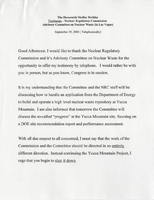Search the Special Collections and Archives Portal
Search Results
Lubertha Johnson oral history interview
Identifier
Abstract
Oral history interview with Lubertha Johnson conducted by Larry Buckner on February 10, 1978 for the Ralph Roske Oral History Project on Early Las Vegas. In this interview Lubertha Johnson discusses her family background, work experience, civic activity, and philosophy. She talks about discrimination in the workplace for Black people, segregation in Las Vegas, Nevada, and her forty year membership in the National Association for the Advancement of Colored Peoples (NAACP). She also discusses the historic Westside neighborhood and its schools, the prejudice Black performers faced in the 1950s and 1960s, and how she feels disappointed in President Jimmy Carter.
Archival Collection

Tanya Olson oral history interview: transcript
Date
Archival Collection
Description
Oral history interview with Tanya Olson conducted by Claytee D. White on July 6, 2018 for the Remembering 1 October Oral History Project. In this interview, Olson recalls beginning October 2, 2017 to photograph scenes surrounding the aftermath of the shooting at the Route 91 Country Music Festival. Her efforts culminated in a film that highlights the Healing Garden, a memorial established after the shooting. It was dedicated on the first Friday of October 2017. Her 6-minute film, Forever In Our Hearts, is described as "Citizens unite to provide kindness and salve the wounds caused by the October 1, 2017 massacre during a Las Vegas country concert." The film was shown at the Nevada Women's Film Festival in 2018. Olson discusses beginning her latest endeavor, matriculating at the American Film Institute, a lifelong dream that she is pursuing after 23 years in the military, a film degree from University of Nevada, Las Vegas (UNLV), and completing her film project on one of the worst massacres in American history.
Text
Baratz, Adele
Adele Baratz (née Salton) was born in New Jersey on August 11, 1926 and her family moved to Las Vegas, Nevada when she was two years old. Her father sold bootlegger supplies and later owned and operated Al’s Bar, a popular place to drink among Union Pacific Railroad workers. For two summers, Baratz worked as a messenger and in the rationing department of the Gunnery School at the Las Vegas Army Airfield.
Person


Transcript of interview with Louis F. La Porta by Stefani Evans and Claytee White, November 4, 2016
Date
Archival Collection
Description
Louis La Porta served on the City Council of Henderson, Nevada and the Board of Clark County, Nevada and oversaw periods of great growth. He was born in 1924 in New York City, but his service in the United States Air Force pulled him out West. After settling in Henderson, Nevada, with his wife Elayne, La Porta became interested in insurance sales and local politics. While in office, La Porta oversaw the development of critical roads for Clark County, the Henderson Historical Society, and Henderson Libraries. He recounts each of these major developments in his interview, chronicling the evolution of Henderson, Nevada, into a major city.
Text

Gustavo Ramos Jr. interview, October 25, 2018: transcript
Date
Archival Collection
Description
Interviewed by Laurents Bañuelos-Benitez. Gustavo Ramos Junior was born in Presidio, Texas. Growing up Ramos described his childhood as simple childhood, typical of someone that was born on farmland. At the age 10, Ramos and his family moved to California in hopes of better opportunities. When they arrived in California the family had to live in public housing, despite his father not wanting to, he realized it was the only way his family could start anew. Living in public housing influenced Ramos for the rest of his life, including his career as director of public housing in three states.
Text

Jocelyn Cortez interview, March 18, 2019: transcript
Date
Archival Collection
Description
Interviewed by Nathalie Martinez. Jocelyn Cortez is a Salvadoran-American immigration lawyer. She grew up on the Eastside of Las Vegas and grew up going to school in the Clark County School District and at UNLV before going to Law School at the University of Arizona. She is an engaged community member as an immigration lawyer working alongside the Culinary Union and the Latino Bar Association.
Text

John Robinson Pacheco interview, June 24, 2019: transcript
Date
Archival Collection
Description
Interviewed by Laurents Bañuelos-Benitez. John Pacheco's father, Francisco, arrived in Las Vegas in 1942. John was born in 1947 and raised mostly on 27th Street. He is a graduate of Rancho High School and UNLV. He is a retired artist known for hand-painting signage for many local businesses. As a very civic minded person, John has received many local awards and served on committees for the Las Vegas Chamber of Commerce, East Las Vegas community, and much more.
Text

Abraham Gomez interview, December 6, 2019: transcript
Date
Archival Collection
Description
Interviewed by Elsa Lopez. Abraham Gomez is a College Navigator for the Nevada Treasurer's Office where he is responsible for providing and distributing information on post-secondary resources that may enable Nevadans to go to college. Gomez was born and raised in Las Vegas, Nevada and grew up on the East Side near Desert Pines High School. He received an Associate of Arts from the College of Southern Nevada before obtaining a bachelor's degree in Communication Studies from the University of Nevada, Reno. After graduating he worked as a GEAR UP Ambassador for Nevada State College where he advised a cohort of 46 low-income students on the importance of continuing their education. He has volunteered with various organizations throughout Southern Nevada and continues to work to better his community and make education accessible to students everywhere.
Text

Transcript of interview with Betty Joyce Clark by Steven Knowles, February 16, 1978
Date
Archival Collection
Description
On February 16, 1978, Steven Knowles interviewed Betty Joyce Clark (born 1940 in Cartersville, Georgia) about her experiences living in Las Vegas, Nevada. Clark first talks about her early places of residence, the schools she attended, and some of the businesses she remembered from the time. She also discusses bus transportation, the first hospitals in town, and the early development of the Las Vegas Strip. Additional topics include the development of utility services for homes, early railroad activity, the development of North Las Vegas, and the first airport and airline services. The latter part of the interview includes discussion of the first department stores, the tourist population, the racial makeup of the city, the police department, and the extent of crime in Las Vegas. The interview finalizes with Clark’s thoughts on the growth of Las Vegas.
Text
